Unit 12 Life is full of the unexpected.Section A Grammar focus-4c(共32张PPT)
文档属性
| 名称 | Unit 12 Life is full of the unexpected.Section A Grammar focus-4c(共32张PPT) | 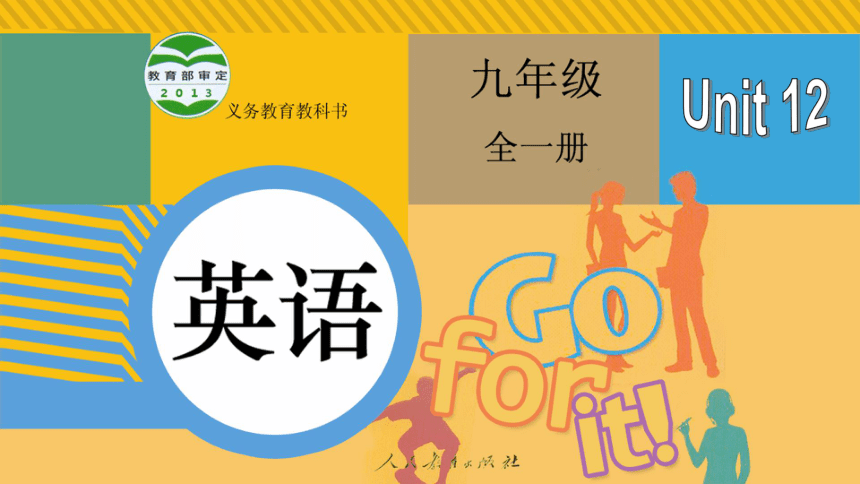 | |
| 格式 | zip | ||
| 文件大小 | 4.7MB | ||
| 资源类型 | 教案 | ||
| 版本资源 | 人教新目标(Go for it)版 | ||
| 科目 | 英语 | ||
| 更新时间 | 2023-09-28 11:42:15 | ||
图片预览


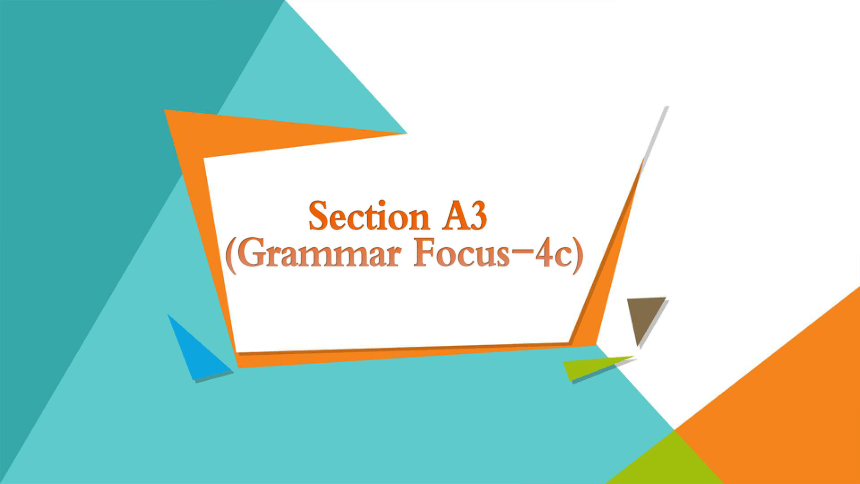
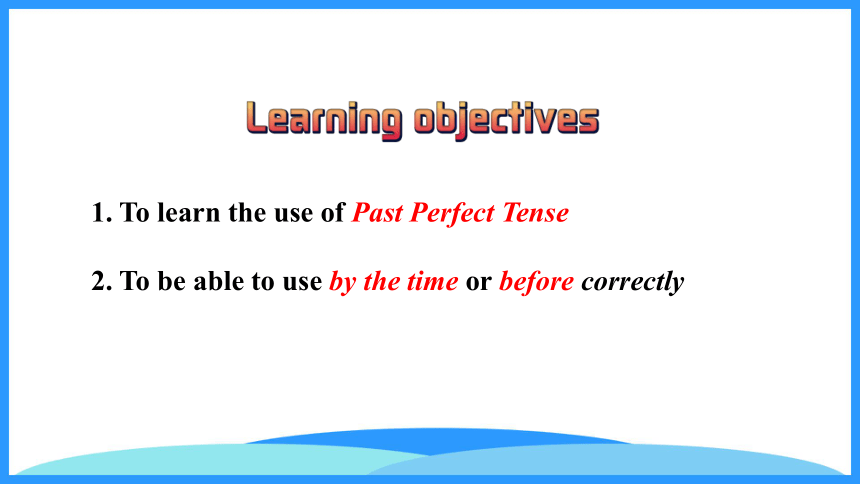
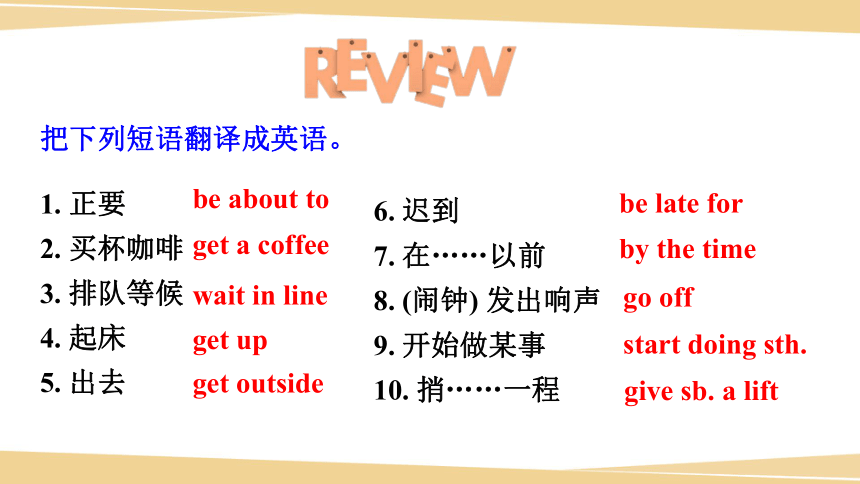
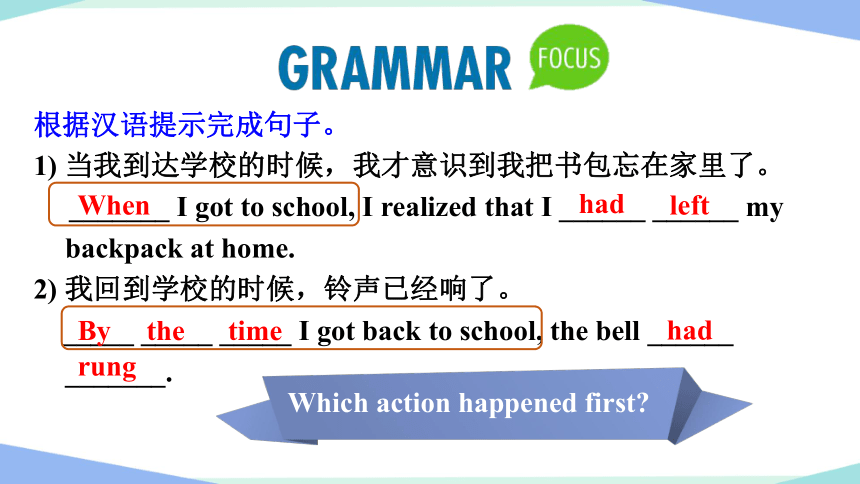
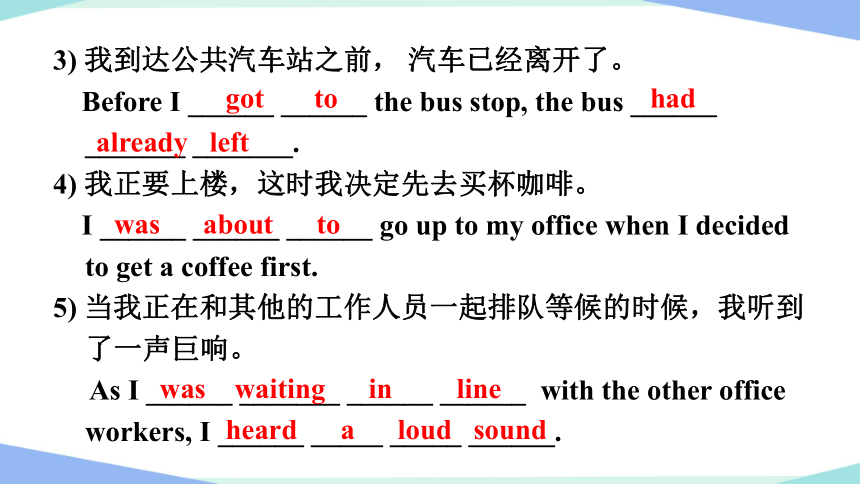
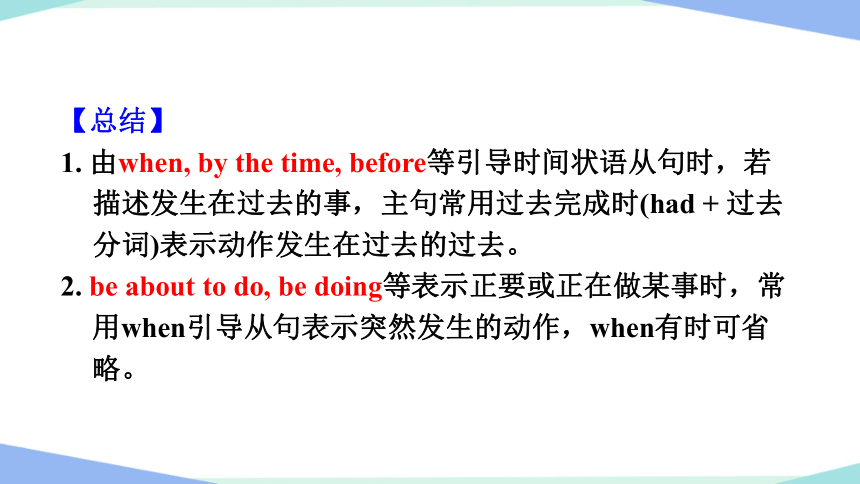

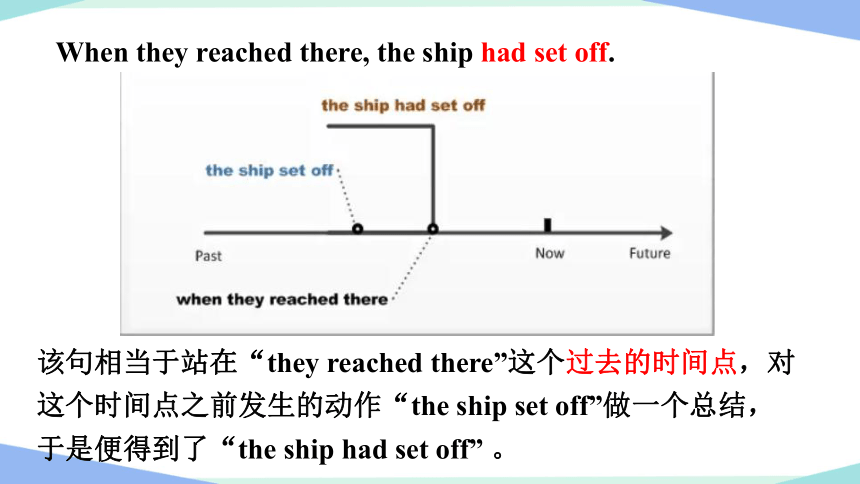
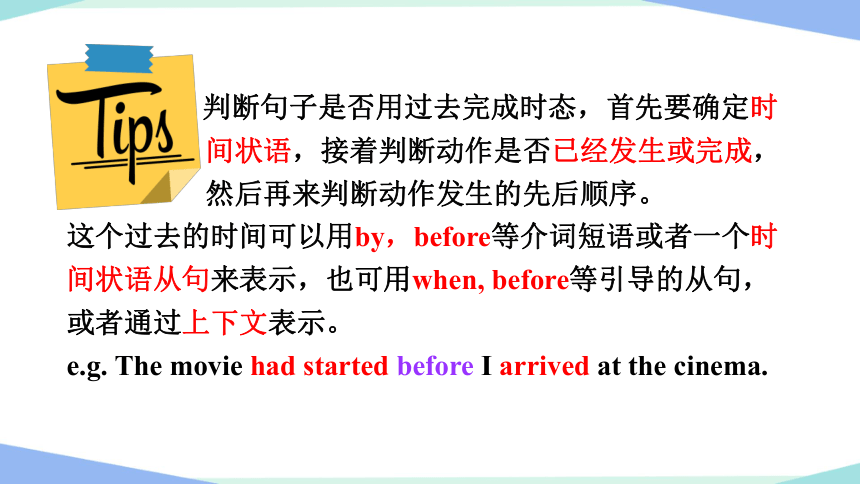
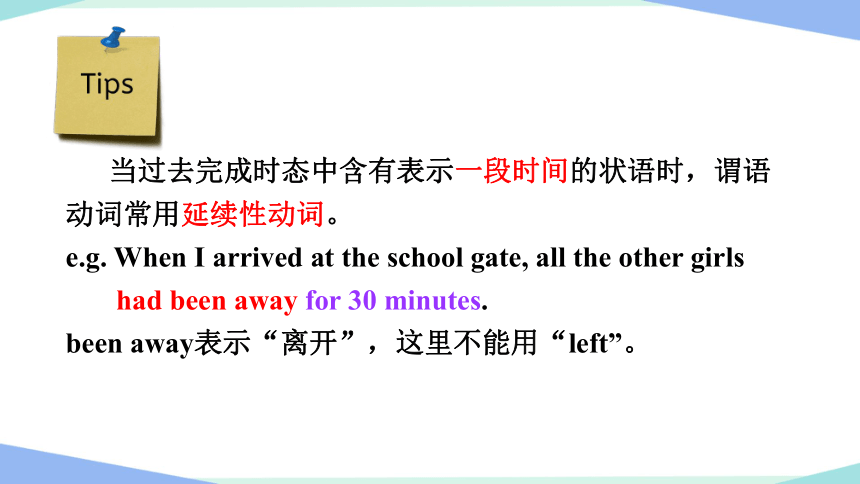
文档简介
(共32张PPT)
Unit 12
Unit 12
Life is full of
the unexpected.
Unit 12
Life is full of
the unexpected.
1. To learn the use of Past Perfect Tense
2. To be able to use by the time or before correctly
把下列短语翻译成英语。
1. 正要
2. 买杯咖啡
3. 排队等候
4. 起床
5. 出去
be about to
get a coffee
wait in line
get up
get outside
6. 迟到
7. 在……以前
8. (闹钟) 发出响声
9. 开始做某事
10. 捎……一程
be late for
by the time
go off
start doing sth.
give sb. a lift
1) 当我到达学校的时候,我才意识到我把书包忘在家里了。
_______ I got to school, I realized that I ______ ______ my backpack at home.
2) 我回到学校的时候,铃声已经响了。
_____ _____ _____ I got back to school, the bell ______ _______.
When
had
left
By the time
had
根据汉语提示完成句子。
Which action happened first
rung
3) 我到达公共汽车站之前, 汽车已经离开了。
Before I ______ ______ the bus stop, the bus ______ _______ _______.
4) 我正要上楼,这时我决定先去买杯咖啡。
I ______ ______ ______ go up to my office when I decided to get a coffee first.
5) 当我正在和其他的工作人员一起排队等候的时候,我听到了一声巨响。
As I ______ _______ ______ ______ with the other office workers, I ______ _____ _____ ______.
was about to
was waiting in line
heard a loud sound
got to
had
already left
【总结】
1. 由when, by the time, before等引导时间状语从句时,若描述发生在过去的事,主句常用过去完成时(had + 过去分词)表示动作发生在过去的过去。
2. be about to do, be doing等表示正要或正在做某事时,常用when引导从句表示突然发生的动作,when有时可省略。
过去完成时表示一个动作或状态在过去某一时间或动作之前已经完成,发生在“过去的过去”。
过去的过去 过去 现在 将来
过去完成时
过去完成时
When they reached there, the ship had set off.
该句相当于站在“they reached there”这个过去的时间点,对这个时间点之前发生的动作“the ship set off”做一个总结,于是便得到了“the ship had set off” 。
判断句子是否用过去完成时态,首先要确定时间状语,接着判断动作是否已经发生或完成,然后再来判断动作发生的先后顺序。
这个过去的时间可以用by,before等介词短语或者一个时间状语从句来表示,也可用when, before等引导的从句,或者通过上下文表示。
e.g. The movie had started before I arrived at the cinema.
当过去完成时态中含有表示一段时间的状语时,谓语动词常用延续性动词。
e.g. When I arrived at the school gate, all the other girls had been away for 30 minutes.
been away表示“离开”,这里不能用“left”。
1. 肯定式:主语 + had + 动词的过去分词 + 其他.
过去完成时的构成
e.g. When I woke up, it had stopped raining.
By the time I got to the airport, the plane had taken off.
2. 否定式:主语 + had not / hadn’t + 动词的过去分词+ 其他.
e.g. Julian hadn’t cleaned up the house before his mother got home yesterday afternoon.
e.g. —Had you learned about the culture in the country before you came here
—Yes, I had. / No, I hadn’t.
3. 一般疑问句式:Had + 主语 + 动词的过去分词 + 其他
肯定回答:Yes, 主语 + had. 否定回答:No, 主语 + hadn’t.
4. 特殊疑问句式:疑问词(who除外) + had + 主语 + 动词的过去分词+其他
e.g. How many times had you been to Beijing before you went to college
现在完成时&过去完成时
时态 参照时间不同 时间状语不同 例句
现在完成时 站在“现在”的角度回顾过去,表示一个从过去持续到现在的动作或事件,对现在仍有影响。 时间状语常用today, this week, this year, recently等 We have lived here for ten years.
过去完成时 站在“过去”的角度回顾一个更远的过去,表示一个事件从这个更远的过去持续到离现在较近的过去。句子中必须有一个表示过去的时间或动作的参照点。 时间状语常用by, by the end of, by the time, before, when等构成的短语或从句 We had lived here for ten years when we had to move last year.
过去完成时的动作发生在“过去的过去”,表示过去某一时间以前发生的动作或存在的状态。
一般过去时表示过去某时间发生的动作或存在的状态。
e.g. After he had done his homework, he went out to play football.
By the time / When I got home, she had locked the door.
过去完成时与一般过去时
Make sentences using by the time or before.
1. Tim went into the bathroom. Mary got up.
By the time Mary got up, Tim had already gone into the bathroom.
2. The coffee became cold. I put cream (n. 奶油) in the coffee.
3. The teacher collected the math homework. I got to school.
Before I could put cream in the coffee, the coffee had become cold.
By the time I got to school, the teacher had collected the math homework.
4. I completed the work for my boss. The workday (n. 工作日) ended.
5. The movie started. I arrived at the cinema.
6. My mother finished making the apple pie. I got home from my language course.
I had completed the work for my boss before the workday ended.
The movie had started before I arrived at the cinema.
By the time I got home from my language course, my mother had finished making the apple pie.
Fill in the blanks with the correct forms of the words in the box.
1. By the time I arrived at the party, everyone else _____ already __________.
2. When he put the noodles into a bowl, he realized he ______________ to add the green beans (n. 豆).
3. By the time my mother came back from the market (n. 市场), I ______ already __________ of the door to go to my piano lesson.
rush out forget arrive at go into show up
(赶到;露面)
find out
shown up
had
had forgotten
had
rushed out
4. Before she got to the airport, she ______________ about the earthquake.
5. When she ___________ the movie theater, she remembered she had forgotten to feed her dog.
6. Before she got a chance to say goodbye, he ____________ the building.
(had) found out
arrived at
had gone into
rush out forget arrive at go into show up
find out
Write two true statements and one false statement about your day yesterday. Then ask your classmates to guess the false statement.
1. By the time I left for school in the morning, __________________________________
__________________________________
__________________________________
I had already had breakfast.
I had already brushed my teeth.
I had already finished my homework.
2. By the end of the school day,
__________________________________
__________________________________
__________________________________
3. By dinner time, I_________________________________
I_________________________________
I_________________________________
I have got a present from Tom.
I had had these articles read.
I had finished my homework.
had had too many apples.
had eaten plenty of meat.
had all the housework finished.
1. 过去完成时的构成:_____+___________
2. 过去完成时表示:
_______________________________________________
3. 过去完成时常与_________________________等引导的时间状语连用。
had
过去分词
when, before, by the time
过去某一时刻或动作之前已经发生或完成的动作
句型
When I got to school, I realized that I had left my backpack at home.
By the time I got back to school, the bell had rung.
Before I got to the bus stop, the bus had already left.
I was about to go up to my office when I decided to get a coffee first.
As I was waiting in line with the other office workers, I heard a loud sound.
Ⅰ. 根据语境,用括号内所给动词的正确时态填空。
1. When Mathew arrived at the supermarket, he realized that he ___________(leave) his wallet at home.
2. Mrs. Black ____________(close) the window before she went to bed.
3. Mr. Reid ____________(live) in that village for 30 years before he moved to London.
(had) left
(had) closed
had lived
4. Helen watched her favorite TV program after she _____________(finish) her homework.
5. By the end of last term, Joe ____________(read) about 30 books.
(had) finished
had read
Ⅱ. 将各题中的两个句子合并为一句。
1. I arrived at the cinema. The film started.
When I arrived at the cinema, _______________________.
2. Judy got to the party. Everyone else began dancing.
By the time Judy got to the party, ____________________________.
3. We were having a picnic. It started to rain.
As ____________________________, it started to rain.
4. Dave greeted us with a smile. He saw us.
____________________________ when he saw us.
the film had started
everyone else had begun dancing
we were having a picnic
David greeted us with a smile
Ⅲ. 根据短文内容,用括号内所给词语的正确时态和语态填空。
Mars is a red planet. It (1)_________(move) around the sun just like the earth. Humans have always wanted to explore (探索) it, but nobody (2)_________(be) there so far. It is reported that scientists (3)_________(send) more than forty Mars probes (探测器) up successfully into space by the end of 2020.
moves
has been
had sent
Humans (4) ________(start) to send probes to Mars in 1960. The first successful probe to leave Earth orbit (轨道) was sent up into space on November 1st, 1962, but it (5)_________(fail) to reach Mars. On November 28th, 1964, the US sent up the probe Mariner 4 (水手4号) into space. It became the world's first probe to fly by Mars successfully.
On July 23rd, 2020, China successfully (6)__________ (send) up its first Mars probe Tianwen-1 into space in Wenchang, Hainan Province.
failed
sent
started
On April 24th, 2021, the Mars rover (火星车) of Tianwen-1 (7) ___________(name) Zhurong. On May 15th, 2021, Zhurong (8)____________(succeed) in landing on the surface of Mars. By August 6th, 2021, it (9) ___________(work) there for over two and a half months. At the same time, it (10)____________(travel) more than 800 meters.
succeeded
had worked
had traveled
was named
1. Make three sentences with before, by the time and be doing … when.
2. Preview 1a-1e in Section B.
Unit 12
Unit 12
Life is full of
the unexpected.
Unit 12
Life is full of
the unexpected.
1. To learn the use of Past Perfect Tense
2. To be able to use by the time or before correctly
把下列短语翻译成英语。
1. 正要
2. 买杯咖啡
3. 排队等候
4. 起床
5. 出去
be about to
get a coffee
wait in line
get up
get outside
6. 迟到
7. 在……以前
8. (闹钟) 发出响声
9. 开始做某事
10. 捎……一程
be late for
by the time
go off
start doing sth.
give sb. a lift
1) 当我到达学校的时候,我才意识到我把书包忘在家里了。
_______ I got to school, I realized that I ______ ______ my backpack at home.
2) 我回到学校的时候,铃声已经响了。
_____ _____ _____ I got back to school, the bell ______ _______.
When
had
left
By the time
had
根据汉语提示完成句子。
Which action happened first
rung
3) 我到达公共汽车站之前, 汽车已经离开了。
Before I ______ ______ the bus stop, the bus ______ _______ _______.
4) 我正要上楼,这时我决定先去买杯咖啡。
I ______ ______ ______ go up to my office when I decided to get a coffee first.
5) 当我正在和其他的工作人员一起排队等候的时候,我听到了一声巨响。
As I ______ _______ ______ ______ with the other office workers, I ______ _____ _____ ______.
was about to
was waiting in line
heard a loud sound
got to
had
already left
【总结】
1. 由when, by the time, before等引导时间状语从句时,若描述发生在过去的事,主句常用过去完成时(had + 过去分词)表示动作发生在过去的过去。
2. be about to do, be doing等表示正要或正在做某事时,常用when引导从句表示突然发生的动作,when有时可省略。
过去完成时表示一个动作或状态在过去某一时间或动作之前已经完成,发生在“过去的过去”。
过去的过去 过去 现在 将来
过去完成时
过去完成时
When they reached there, the ship had set off.
该句相当于站在“they reached there”这个过去的时间点,对这个时间点之前发生的动作“the ship set off”做一个总结,于是便得到了“the ship had set off” 。
判断句子是否用过去完成时态,首先要确定时间状语,接着判断动作是否已经发生或完成,然后再来判断动作发生的先后顺序。
这个过去的时间可以用by,before等介词短语或者一个时间状语从句来表示,也可用when, before等引导的从句,或者通过上下文表示。
e.g. The movie had started before I arrived at the cinema.
当过去完成时态中含有表示一段时间的状语时,谓语动词常用延续性动词。
e.g. When I arrived at the school gate, all the other girls had been away for 30 minutes.
been away表示“离开”,这里不能用“left”。
1. 肯定式:主语 + had + 动词的过去分词 + 其他.
过去完成时的构成
e.g. When I woke up, it had stopped raining.
By the time I got to the airport, the plane had taken off.
2. 否定式:主语 + had not / hadn’t + 动词的过去分词+ 其他.
e.g. Julian hadn’t cleaned up the house before his mother got home yesterday afternoon.
e.g. —Had you learned about the culture in the country before you came here
—Yes, I had. / No, I hadn’t.
3. 一般疑问句式:Had + 主语 + 动词的过去分词 + 其他
肯定回答:Yes, 主语 + had. 否定回答:No, 主语 + hadn’t.
4. 特殊疑问句式:疑问词(who除外) + had + 主语 + 动词的过去分词+其他
e.g. How many times had you been to Beijing before you went to college
现在完成时&过去完成时
时态 参照时间不同 时间状语不同 例句
现在完成时 站在“现在”的角度回顾过去,表示一个从过去持续到现在的动作或事件,对现在仍有影响。 时间状语常用today, this week, this year, recently等 We have lived here for ten years.
过去完成时 站在“过去”的角度回顾一个更远的过去,表示一个事件从这个更远的过去持续到离现在较近的过去。句子中必须有一个表示过去的时间或动作的参照点。 时间状语常用by, by the end of, by the time, before, when等构成的短语或从句 We had lived here for ten years when we had to move last year.
过去完成时的动作发生在“过去的过去”,表示过去某一时间以前发生的动作或存在的状态。
一般过去时表示过去某时间发生的动作或存在的状态。
e.g. After he had done his homework, he went out to play football.
By the time / When I got home, she had locked the door.
过去完成时与一般过去时
Make sentences using by the time or before.
1. Tim went into the bathroom. Mary got up.
By the time Mary got up, Tim had already gone into the bathroom.
2. The coffee became cold. I put cream (n. 奶油) in the coffee.
3. The teacher collected the math homework. I got to school.
Before I could put cream in the coffee, the coffee had become cold.
By the time I got to school, the teacher had collected the math homework.
4. I completed the work for my boss. The workday (n. 工作日) ended.
5. The movie started. I arrived at the cinema.
6. My mother finished making the apple pie. I got home from my language course.
I had completed the work for my boss before the workday ended.
The movie had started before I arrived at the cinema.
By the time I got home from my language course, my mother had finished making the apple pie.
Fill in the blanks with the correct forms of the words in the box.
1. By the time I arrived at the party, everyone else _____ already __________.
2. When he put the noodles into a bowl, he realized he ______________ to add the green beans (n. 豆).
3. By the time my mother came back from the market (n. 市场), I ______ already __________ of the door to go to my piano lesson.
rush out forget arrive at go into show up
(赶到;露面)
find out
shown up
had
had forgotten
had
rushed out
4. Before she got to the airport, she ______________ about the earthquake.
5. When she ___________ the movie theater, she remembered she had forgotten to feed her dog.
6. Before she got a chance to say goodbye, he ____________ the building.
(had) found out
arrived at
had gone into
rush out forget arrive at go into show up
find out
Write two true statements and one false statement about your day yesterday. Then ask your classmates to guess the false statement.
1. By the time I left for school in the morning, __________________________________
__________________________________
__________________________________
I had already had breakfast.
I had already brushed my teeth.
I had already finished my homework.
2. By the end of the school day,
__________________________________
__________________________________
__________________________________
3. By dinner time, I_________________________________
I_________________________________
I_________________________________
I have got a present from Tom.
I had had these articles read.
I had finished my homework.
had had too many apples.
had eaten plenty of meat.
had all the housework finished.
1. 过去完成时的构成:_____+___________
2. 过去完成时表示:
_______________________________________________
3. 过去完成时常与_________________________等引导的时间状语连用。
had
过去分词
when, before, by the time
过去某一时刻或动作之前已经发生或完成的动作
句型
When I got to school, I realized that I had left my backpack at home.
By the time I got back to school, the bell had rung.
Before I got to the bus stop, the bus had already left.
I was about to go up to my office when I decided to get a coffee first.
As I was waiting in line with the other office workers, I heard a loud sound.
Ⅰ. 根据语境,用括号内所给动词的正确时态填空。
1. When Mathew arrived at the supermarket, he realized that he ___________(leave) his wallet at home.
2. Mrs. Black ____________(close) the window before she went to bed.
3. Mr. Reid ____________(live) in that village for 30 years before he moved to London.
(had) left
(had) closed
had lived
4. Helen watched her favorite TV program after she _____________(finish) her homework.
5. By the end of last term, Joe ____________(read) about 30 books.
(had) finished
had read
Ⅱ. 将各题中的两个句子合并为一句。
1. I arrived at the cinema. The film started.
When I arrived at the cinema, _______________________.
2. Judy got to the party. Everyone else began dancing.
By the time Judy got to the party, ____________________________.
3. We were having a picnic. It started to rain.
As ____________________________, it started to rain.
4. Dave greeted us with a smile. He saw us.
____________________________ when he saw us.
the film had started
everyone else had begun dancing
we were having a picnic
David greeted us with a smile
Ⅲ. 根据短文内容,用括号内所给词语的正确时态和语态填空。
Mars is a red planet. It (1)_________(move) around the sun just like the earth. Humans have always wanted to explore (探索) it, but nobody (2)_________(be) there so far. It is reported that scientists (3)_________(send) more than forty Mars probes (探测器) up successfully into space by the end of 2020.
moves
has been
had sent
Humans (4) ________(start) to send probes to Mars in 1960. The first successful probe to leave Earth orbit (轨道) was sent up into space on November 1st, 1962, but it (5)_________(fail) to reach Mars. On November 28th, 1964, the US sent up the probe Mariner 4 (水手4号) into space. It became the world's first probe to fly by Mars successfully.
On July 23rd, 2020, China successfully (6)__________ (send) up its first Mars probe Tianwen-1 into space in Wenchang, Hainan Province.
failed
sent
started
On April 24th, 2021, the Mars rover (火星车) of Tianwen-1 (7) ___________(name) Zhurong. On May 15th, 2021, Zhurong (8)____________(succeed) in landing on the surface of Mars. By August 6th, 2021, it (9) ___________(work) there for over two and a half months. At the same time, it (10)____________(travel) more than 800 meters.
succeeded
had worked
had traveled
was named
1. Make three sentences with before, by the time and be doing … when.
2. Preview 1a-1e in Section B.
同课章节目录
- Unit 1 How can we become good learners.
- Section A
- Section B
- Unit 2 I think that mooncakes are delicious!
- Section A
- Section B
- Unit 3 Could you please tell me where the restroom
- Section A
- Section B
- Unit 4 I used to be afraid of the dark.
- Section A
- Section B
- Unit 5 What are the shirts made of?
- Section A
- Section B
- Review of Units 1-5
- Unit 6 When was it invented?
- Section A
- Section B
- Unit 7 Teenagers should be allowed to choose their
- Section A
- Section B
- Unit 8 It must belong to Carla.
- Section A
- Section B
- Unit 9 I like music that I can dance to.
- Section A
- Section B
- Unit 10 You're supposed to shake hands.
- Section A
- Section B
- Review of Units 6-10
- Unit 11 Sad movies make me cry.
- Section A
- Section B
- Unit 12 Life is full of the unexpected
- Section A
- Section B
- Unit 13 We're trying to save the earth!
- Section A
- Section B
- Unit 14 I remember meeting all of you in Grade 7.
- Section A
- Section B
- Review of Units 11-14
